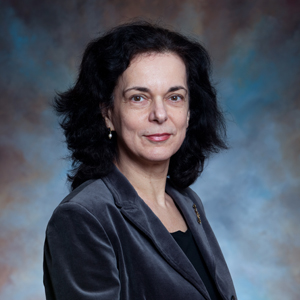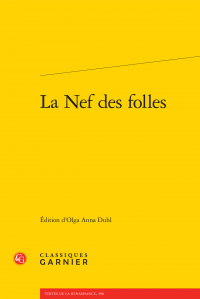It may not be common knowledge that the concept of a liberal arts education is based on classical and medieval models, but that fact perfectly illustrates the intersection of Olga Anna Duhl’s academic interests. And she delights in sharing that with her students.

Professor Olga Anna Duhl
Duhl, professor of foreign languages and literatures (French) and co-chair of the Medieval, Renaissance, and Early Modern Studies program, specializes primarily in late medieval-early Renaissance French literature, a transition period that encompasses such world-changing events as the invention of the printing press, rebirth of classical antiquity, fall of Constantinople, Columbus’s first voyage to America, expulsion of Jews from Spain, Black Death (bubonic plague), and Reformation. Duhl calls it “one of the most dynamic periods in the Western world, if not in human history.”
Studying another language and culture—in this case, French—not only instills in students knowledge and appreciation of France and the Francophone world, it also teaches them about themselves, she says.
“I want them to take a critical view of their own language and culture by studying those of other geographic areas and historical periods,” says Duhl, a recipient of Lafayette’s Marie Louise Van Artsdalen Prize for outstanding scholarly achievement, Thomas Roy and Lura Forrest Jones Faculty Award for superior teaching and scholarship, and Jones Faculty Lecture Award, among other honors. “I hope to offer a mirror image of themselves by studying French language and culture.”
Groundbreaking Scholarship
This year the prestigious Parisian publishing house Classiques Garnier published Duhl’s critical edition of La Nef des folles (The Ship of Foolish Maidens) as part of its Textes de la Renaissance (Texts of the Renaissance) series. The groundbreaking work examines Jehan Drouyn’s Middle French adaptation of a Latin text by the humanist printer-author-pedagogue Jodocus Badius Ascensius, which is an addendum to Sebastian Brant’s popular satire the Narrenschiff, published in 1494 in German. Duhl first discovered Drouyn’s adaptation while working on a critical edition of a late-medieval “fools” play, Sotise a huit personnaiges [le Nouveau Monde] (Sotise Played by Eight Characters [The New World] (Geneva, Droz, 2005), which has similar themes to La Nef des folles. Duhl’s edition also is the first one in which the French adaptation of the Latin text, written between 1498 and 1501, has been made available to modern readers beyond the 16th century.

“La Nef des folles” by Olga Anna Duhl
Duhl worked on the project for nearly 10 years, traveling to libraries in the United States and France to conduct research. She based her edition on the oldest known printed copy of the text from the library and archives of the renowned Château de Chantilly, France, and incorporated another copy from the French National Library in Paris as an important example of cultural appropriation. In addition to making the text accessible to the modern reader, Duhl closely analyzes its historical, religious, gender, and linguistic aspects, providing a comprehensive reference that is the first of its kind for La Nef des folles.
Many students assisted Duhl with transcribing the text, compiling the bibliography, and reading related articles through Lafayette’s EXCEL Scholars undergraduate research program. Richard Lear ’06, a French and government & law graduate, and Ihssane Loudiyi ’07, a computer science and economics graduate, were especially instrumental in the book’s completion, and Loudiyi, a native French speaker, also helped with the complex task of compiling the glossary.
Before beginning work on her research, Duhl teaches her EXCEL students, most of whom have completed course work in medieval and Renaissance studies, techniques of reading early modern texts. Duhl considers herself fortunate to have worked with “stellar” students able to keep up with the intricate work involved in her research.
“The liberal arts education doesn’t end in the classroom. It involves students’ active engagement with knowledge in general,” she says. “I have this liberal arts background myself. Not only do they learn from me, but I learn from them; I really look at it from the perspective of collaboration. It is important for students to get the liberal arts education as deep as possible and as interdisciplinary as possible. I’m the ultimate liberal arts person, and that’s how I want my students to feel when they graduate.”
Duhl just signed another contract with Classiques Garnier for a book project on the lyric subject in late 15th and early 16th century drama, which will be part of the publisher’s Recherches littéraires médiévales (Medieval Literary Research) series. She plans to take a sabbatical to work on the project, and like before, will enlist the help of EXCEL Scholars.
Multidisciplinary Collaboration
Multidisciplinary collaboration is important to Duhl. Last semester, she worked with Mary Toulouse, director of the Foreign Languages and Literatures Resource Center (FLLRC) and visiting instructor of French, to coordinate an exhibition to commemorate the 850th anniversary of the Cathedral of Notre-Dame in Paris. Students in Duhl’s High and Popular Culture in Medieval and Renaissance France seminar worked in small groups to explore the cathedral from cultural, historical, artistic, and media perspectives. They created bilingual posters of their findings and presented them at the opening of the exhibition, which is on view in the FLLRC until the end of November. Leonard Van Gulick, Matthew Baird Professor of Mechanical Engineering and an expert on Gothic architecture, gave a presentation at the exhibition opening, followed by an engineering student who presented a portion of his honors thesis on Gothic cathedrals.
Since 1998, Duhl has been a member of the international, interdisciplinary Research Center Textes, Discours, Représentations (Texts, Discourses, Representations) at the University of Bourgogne in Dijon, France, for which she organizes conferences and edits proceedings. She is co-editing the proceedings from the 2011 conference held in Dijon, The Five Senses, between the Middle Ages and the Renaissance: Epistemological and Aesthetic Approaches.
Duhl also is a participating faculty member of the Teagle Diversity Initiative, a $300,000 grant awarded to Lafayette, Bucknell University, and Dickinson College in 2011 by the Teagle Foundation to enhance diversity and diversity education. Next semester, Duhl will incorporate more themes of diversity into her High and Popular Culture in Medieval and Renaissance France seminar as part of the initiative.

